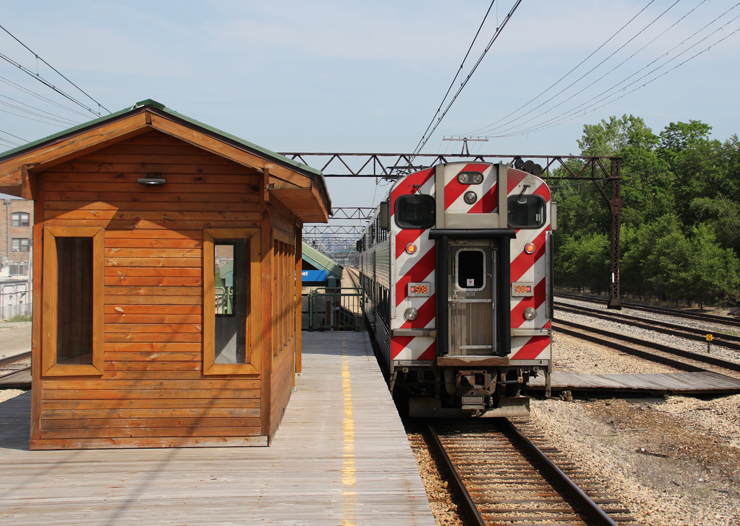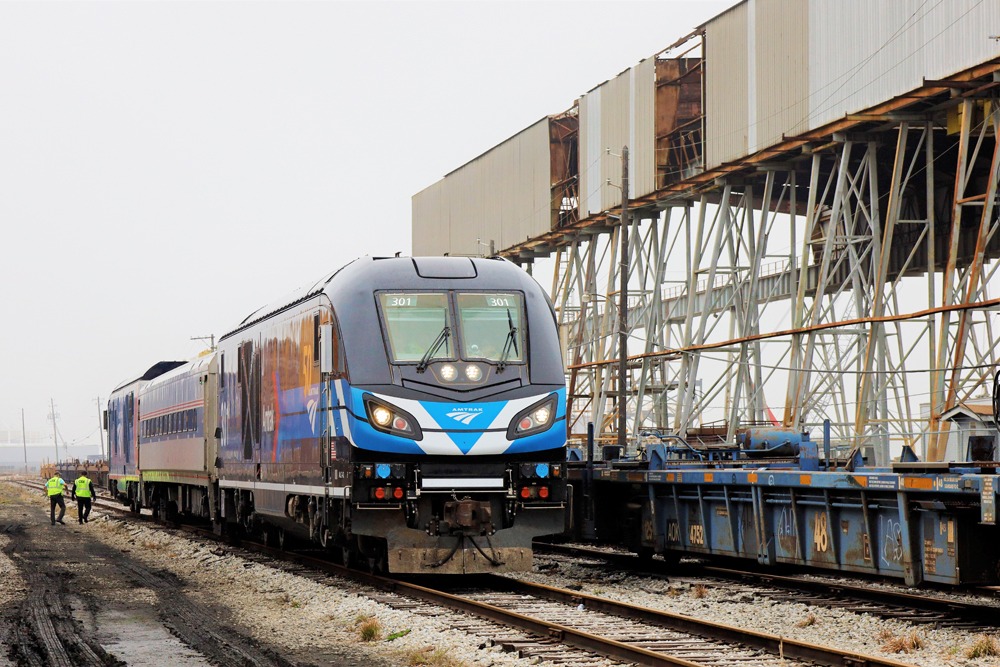CHICAGO — Mayor Lori Lightfoot has come out against a plan to reduce fares and increase service on two Metra lines serving Chicago’s South Side, saying it will hurt Chicago Transit Authority ridership.
The Chicago Tribune reports that Lightfoot told journalists she’s opposed, based on analysis that shows the proposed increase in service on the Metra Electric and Rock Island districts “is essentially a transfer of CTA passengers to the Metra line.” While she agrees portions of the South Side are underserved, she said she would not support “something that would have the effect of diminishing ridership at the CTA.”
Cook County Board President Toni Preckwinkle presented a plan for lower fares and more service on the two Metra lines earlier this week, which the county would help subsidize. An Illinois legislator introduced a similar proposal earlier this year [See “Bill introduced to lower Metra Electric fares in Chicago,” Trains News Wire, May 8, 2019.] Metra has had discussions with the county, CTA, and Pace bus system about the plan, but no agreements have been signed.















Here’s a good discussion of this very topic in the blog The Transport Politic.
As for this: “There’s a difference of service between Metra and CTA”
Why? There should not be a difference. People need to be moved so they can go to work, play and school. That’s all that really matters. Making divisions between modes is ridiculous and idiotic.
https://www.thetransportpolitic.com/2019/09/19/the-perverse-incentives-produced-by-institutional-division/
And Charles Landey: Please refrain from your racist postings. They’re vile.
MIKE F. Your post sums it up very nicely. You and I have disagreed in the past but I give you the game ball on this one.
Now I’ll add my own spin if you don’t mind. In the past, before the long process of rebuilding the Metra Electric began, Afro politicians on the south side whined that it wasn’t up to the standards of other Metra lines. And it wasn’t. Now that the Electric is better than before, Afro politicians whine that Metra is taking passengers away from the CTA. Frankly I blame these politicians for the problems in Chicago. They’re so busy giving away the South Side to build The Great Pyramid of Chicago in memory of Pharoah Barack and Empress Michelle that they can’t do what’s best for their own people.
Oh no, people choose the better service! Can’t have that!
*Landey
Mr Landry, you are entitled to your opinion, but I take strong offense at your choice of language. Whether or not you think she is a good mayor, she is a former assistant US Attorney, private lawyer, and is taking on a job neither you nor I would want.
How can an area that is so “under served” not have enough riders for both lines?
The idea of “under served” is that there are more people who need access to transit than what is available.
The issue for the CTA is that Metra will be “over subsidized” compared to them.
That is an RTA issue.
Someone got to Lightfoot before Preckwinkle could finish the coordination at RTA.
If this was in Timbuktoo, Cook County, Lightfoot wouldn’t care.
But because Preckwinkle is cutting a deal for a service in Chicago city limits, then Lightfoot cares.
It’s really simple politics.
No one cuts a deal in Chicago without kissing the mayoral ring. Toni just isn’t into that and that is the real problem.
There’s a difference of service between Metra and CTA. People want the better commuter rail service at the lower price or lower of the CTA. How would that be fair to other Metra Lines riders that would still be paying a premium rate?
To think this fool was by far the better of the two candidates.
I will avoid the name calling here, and simply point out that this is one of those situations where the balkanization of American transit agencies is rather absurd.
The goal is to move people more quickly and easily to their destinations. Especially people who need transit the most (they don’t have cars and are poorer). Worrying about moving ridership from agency A to Agency B should be far down on the list of priorities. The priority should be how do you move people most efficiently from here to there.
I would totally agree that turning Metra Electric into something more closely resembling an L line is a smart use of resources. It shouldn’t cost more to take Metra from 59th Street downtown than it costs to take the Green Line the same distance.
Other than the knee jerk dismissals there is a little substance here but it’s also a good deal misinformed.
There has been a lot of spending on upgrading the CTA Red Line south to 95th, including expansion of the terminal at 95th which has always been an busy bus transfer point. There are additional plans to extend this line south and these for some reason seem to have a higher priority than other rail transit projects and would serve both underserved areas as well as come close to duplicating service to some nearby Metra Electric stops. This is the usual lack of transit spend integration we see in other cities and it’s not unreasonable to be concerned about duplicative service. I’d personally question the overall return on expanding beyond 95th given the better rail service and better transfer conditions.
Where Mayor Lightfoot is uninformed is that the only rapid non-bus rail transit available to the vibrant Hyde Park neighborhood and the U of C as well as a few intermediate points north including McCormick Place is “premium priced” Metra Electric service. It’s totally reasonable to me to try to provide CTA like service (in terms of cost, frequency, and hours of operation) to better serve this market.
Mister McWilliams:
Please do not deprecate fools. If it were not for fools I would have no livelihood.
Back to the issue to hand. Does the Mayor have numbers to back up her allegation? If so, please show them. If not, please explain why she is making a baseless allegation.
The above comments are generic in nature and do not form the basis for an attorney/client relationship. They do not constitute legal advice. I am not your attorney. As God is my witness, I am that fool.
Paul, thanks for reminding me about the RTA. As a former North Shore (Highland Park and Vernon Hills) resident, I should have remembered the agency.
Perhaps the Mayor doesn’t have the expertise to comment about the Metra plan. The RTA is still providing transportation, and the change might ease “crowding” on the CTA trains. I wouldn’t complain about that.
A shame she doesn’t feel that commuters should have a choice for possible better and cheaper service.
FOLKS – I apologize (sort of, half way) for my intemperate language. Certainly Ms. Lightfoot is an admirable person. She belongs to a political movement (the left – and the only – wing of the Democrat Party) that turns formerly intelligent people into politicians whose policies, positions and actions are ridiculous. I should have said her action in this matter was foolish. And typical.
Mr. MacFarlane,
Mr. Landey’s comment was a blanket political statement that made no reference to the specific issues in the story. I objected to his referring to Mayor Lightfoot as “this fool”. My comment does not state or imply that I agree with her position on the expanded Metra service.
Mr. Landey, I must agree that Mr. Wilson is correct. That is a terrible insult. To refer to a lawyer as a fool is disrespectful to fools everywhere!
Mr. Wilson,
Not sure what her background as a U.S. Attorney as to do with her qualifications(besides none), she’s not thinking clearly here…it would only cannibalize CTA ridership if the services are parallel and stop and the same stations…parallel services with stations multiple blocks apart are not equivalent services. Plus Metra Electric terminates closer to the shoreline, CTA goes directly downtown.
The Chicago area already has one transit agency, the Regional Transportation Authority (RTA). Metra (commuter rail), Pace (suburban bus) and CTA (all rapid transit and bus in Chicago) are the operating entities.
This is an example of completing interests among municipal, taxpayer-funded transportation agencies serving the same metropolitan area. New York City is trying to deal with this situation by putting its heavy/light rail transit and bus services under one organization – Metropolitan Transit Authority (MTA). MTA hopes to reduce the overhead and offer an integrated/intermodal transit service. Maybe Chicago should try the same approach; let Metra absorb the CTA (bus and rail).